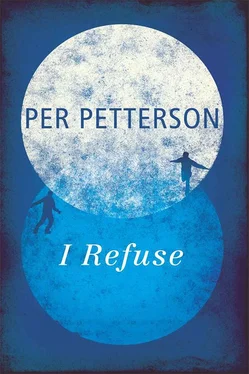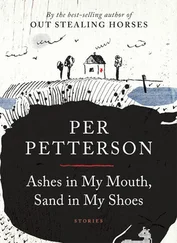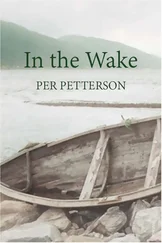After a few steps, he said in a loud voice behind me:
‘Hey, Tommy.’
I stopped and turned.
‘What,’ I said.
‘Do you think I’ll ring.’
‘I don’t know. I hope so.’
‘Heads or tails,’ he said.
‘Heads or tails what.’
He took a coin, a krone, from his pocket. He flicked it into the air, where it twirled round and glistened and landed smack into his hand. He held it up.
‘What’s your choice. Heads or tails,’ he said, and I said:
‘Cut it out, Jim.’
‘What’s your choice.’
I was in despair. I weighed two hundred kilos, something was pulling me to the floor, a huge force had taken hold of me and was dragging me down. What shall I do, I thought. What shall I do. I’ll let go, I thought. I’ll let go.
‘Heads,’ I said.
‘OK,’ he said. ‘Heads I ring. Tails I don’t.’
He spun the coin into the air, and it rose and rose until it hung there up beneath the ceiling and was spinning and didn’t want to come back down, and it made a sound I was certain everyone could hear, it was whistling and flashing and wouldn’t come down, it was Newton suspended, and I looked around the foyer and everything was completely silent, everything frozen, not a soul moved in any direction. I held my breath until my temples throbbed, and then suddenly everybody started moving again, and there was talk and laughter in every corner, and the krone began to fall, slowly at first and then faster and faster, and Jim lifted his right arm and spread his fingers as though his hand were a funnel, a glove, and he grabbed the coin from the air so quickly you could barely see it and closed his hand around it and held it for a moment before slapping it against the back of his left hand and stood still. He stared at his hand. Then he raised it slowly.
‘Tails,’ he said.
We stood straight looking at each other, there were no more than a few metres between us, I will not yield, I thought. But he held my gaze. His eyes glittered, triumphant, I thought. This was what he wanted, I thought. This is how he wants it to be.
‘OK,’ I said, ‘that’s it then,’ and I turned and walked to the entrance and out through the doors and up to where Jonsen’s car was parked.
TOMMY STOOD ON the doorstep of Jonsen’s house very early in the morning, watching Sletten’s van come down the road and pull up in front of Jim’s house before anyone had left for work or the school bus had arrived. Not a car had moved. After some time Jim and his mother came out with rolled-up carpets and boxes and bags of bed linen in their arms and put it all in the back, and Sletten helped them with the furniture, and then Lien too was there to give a hand, and he and Sletten came out with the heavy, red sofa between them, and Sletten had to walk backwards and do whatever Lien told him, left, right, down a bit, he called, up a bit, he called, and Sletten didn’t like Lien telling him what to do, but still, they managed to manoeuvre the sofa all the way through the hall and out through the porch, and out of the door and down the steps to the van, and it would have been the most natural thing in the world for Tommy to go down and help, but there was no way he could. There was a wall of glass between the houses. You saw everything, but you couldn’t get through it.
The sun was up already, it shone through the window at a low angle, and on both sides the light was blinding. Tommy could hear the woodpecker at the top of the telegraph pole tapping against the metal in the still air. It was anemones and snowfall. It was spring in full bloom, it was summer, it was winter. It was everything at once. He stood watching for a while. Then he turned and went back in and closed the door. People die in wars too, he thought. They are here, and bang, they’re gone.
FRU BERGGREN ⋅ 1964 ⋅ 1965
THE MAINLAND LAY alongside the Oslofjord, looking salt and peppery. It was morning now, but not very obvious, not very convincing. She could only just make out the pale, milky, white-scrubbed lights from the two towns facing each other, one either side of the fjord, and it was winter, just before Christmas, and the snow came in over the railings at great speed and it had settled on the hills to the east and west and coloured the waters of the fjord a porridge-grey and had settled on the island that slowly hove into view, closer to one coast than the other. Young offenders were imprisoned here when they were indisputably beyond reform, and all you could do was to strand them on this island, with freedom in plain sight, but only look, don’t touch. The strongest of them, the impatient ones, would sooner or later attempt to escape and then choose the shortest route across the water, through the waves and the wake of ships to reach the shore, but not at this time of year, not now. They would freeze to death.
She stood on deck at the front of the ship with her coat collar turned up and her left hand holding the lapels together at her neck, and she gazed across the fjord, but she didn’t see anything special, there was nothing special she was looking for. Only a few hours earlier she had boarded the ship at one of the quays on the west side of Oslo. Between the edge of the quay and the ship’s hull there was slush and ice, squeezed into a narrow line of froth on the cold water beneath her as she took the step from the quay to the gangway. A solitary lamp burned against the yellow wall of the terminal building. Jonsen sat in his car with the engine running and the headlights dipped and the rear lights gave to the snow a porous, red sheen. It was dark inside the car. He saw the lamp on the wall, and it cast a circle of light on the side of the ship and made the hawsers shine a frozen silver, and it singled out her slim figure in the grey coat on her way up the gangway, and with the suitcase in hand she reached the top and stepped on to the deck. He waited for a sign from her, and she did half turn, but didn’t really pause and didn’t wave, and suddenly he realised how sinister it was, the scene that was being played out here in the gloom on the quay right now, as though what she did was letting her soul sink into the dark well of perdition with no more than a hurried, already vacant glance over her shoulder before she let go and fell, and whatever warmth she might have had, she snuffed out like a burnt-down candle. She took nothing with her, she left nothing behind.
The car stood by the boat for a while yet until Jonsen sat up in his seat and put it into first gear and made a tight turn on the snow-cleared space on the quay and in second gear he picked up speed and even more in third beneath the cranes alongside the huge warehouse until it could no longer be distinguished from the buildings and the ships and what belonged to the ships.
She reported to the steward. He was a tall man, he wasn’t young, on his face there were lines crossing from his nose to his ears unlike most people’s, which ran from their eyes down alongside the mouth, and this made him look like an Indian, a North American Indian of some tribe or other, but she was no expert, it wasn’t she who had read Zane Grey’s novels, it was Berggren, and she thought vaguely it had something to do with being a seaman, seeing the world, seeing many different peoples and pulling your roots up to become one of them. But he was from Hønefoss, and he didn’t look like an Indian there.
He looked down at her brown suitcase. It was not big.
‘Is that all you brought with you,’ he said.
‘Yes,’ she said. ‘This is what’s mine.’
I see, he thought, so this is what’s hers, didn’t she have anything else, in some other place, and if not, how much was it that wasn’t hers, was there a standard for this you could measure it by, the contents of her brown suitcase, maybe, in cubic centimetres, which according to her was all that was hers and nothing more, or proportionate to what she had left behind, but he didn’t have the energy to ask, he thought, she is good-looking, almost too good-looking, and then he thought, she is on the run, of that I am pretty sure. Which, strictly speaking, was none of his business, as long as it wasn’t from the law, and he was certain it was not. He closed his eyes for a second, he was tired, he had slept badly, that was the problem, he had woken in the middle of the night, as more and more often he did, and he couldn’t go back to sleep, and then he lay awake with a book, and what he read was sometimes so upsetting it was five o’clock before he had any peace, and then soon after he had to get out of his bunk. It had been like that for a long time.
Читать дальше












